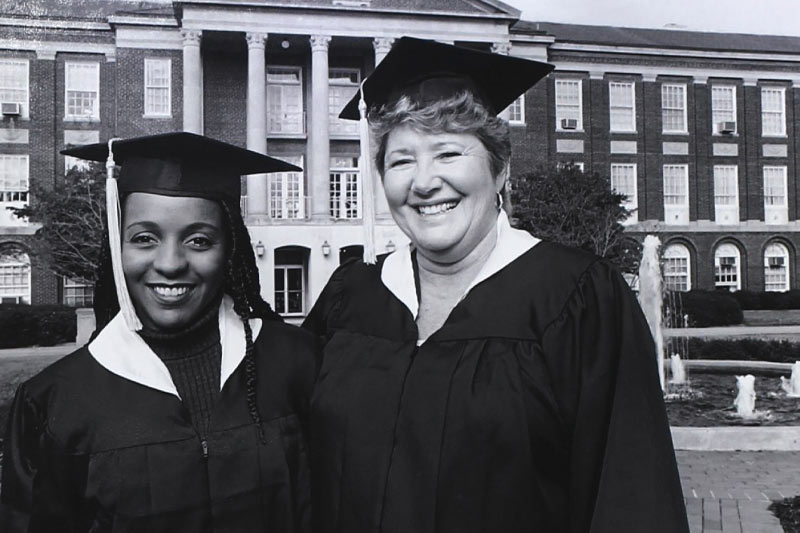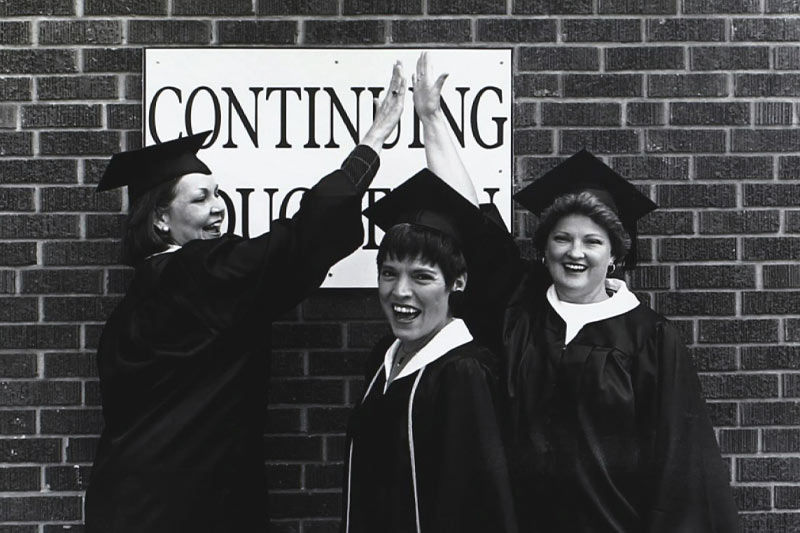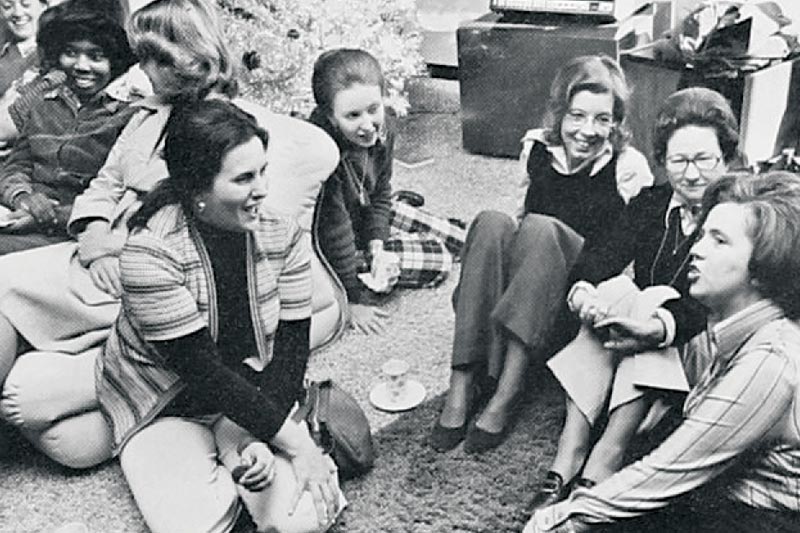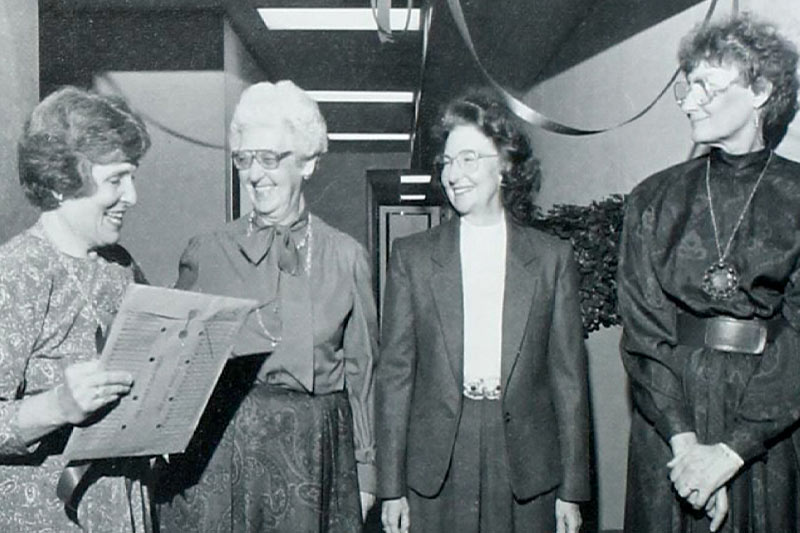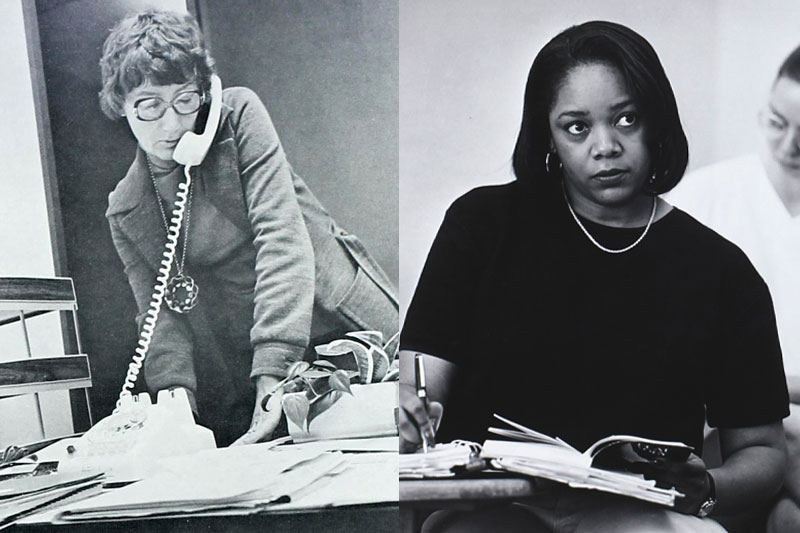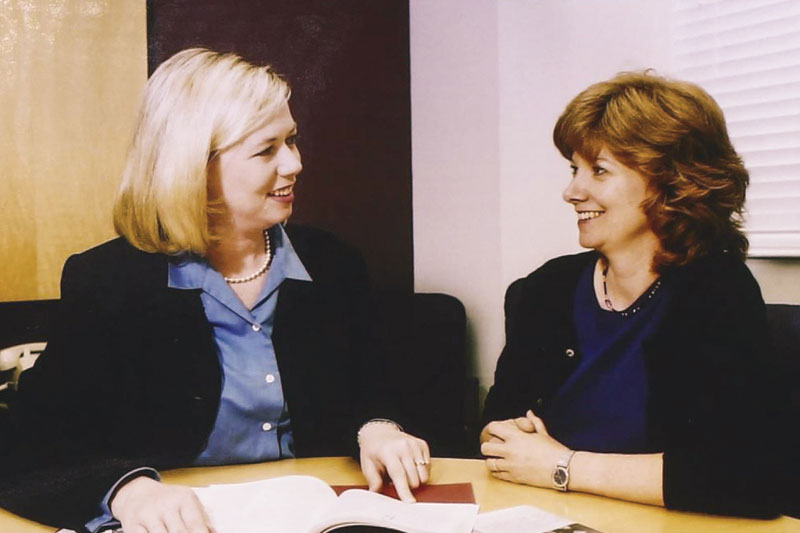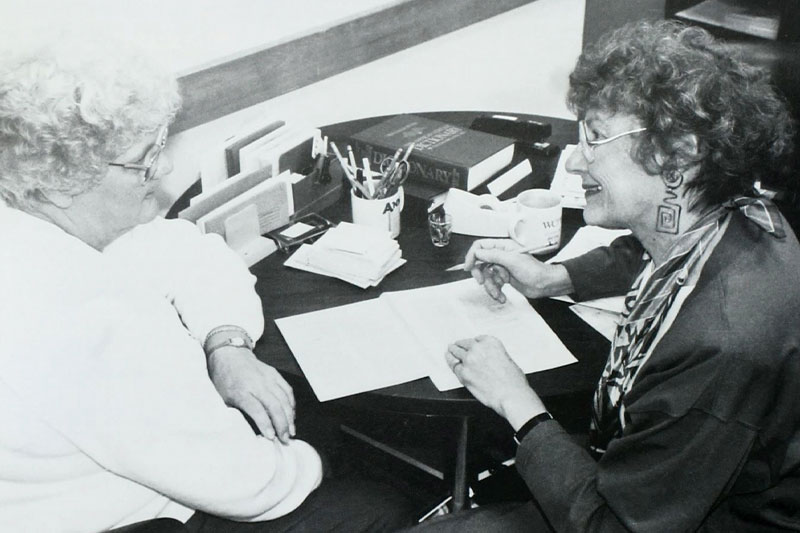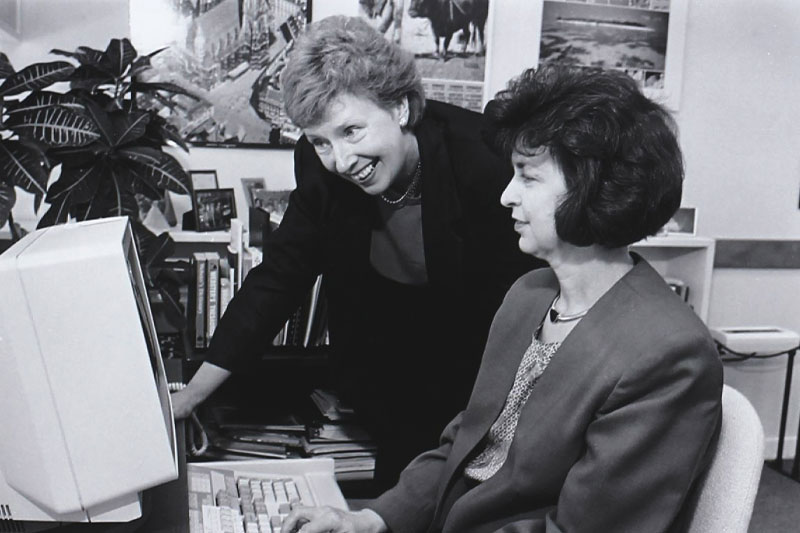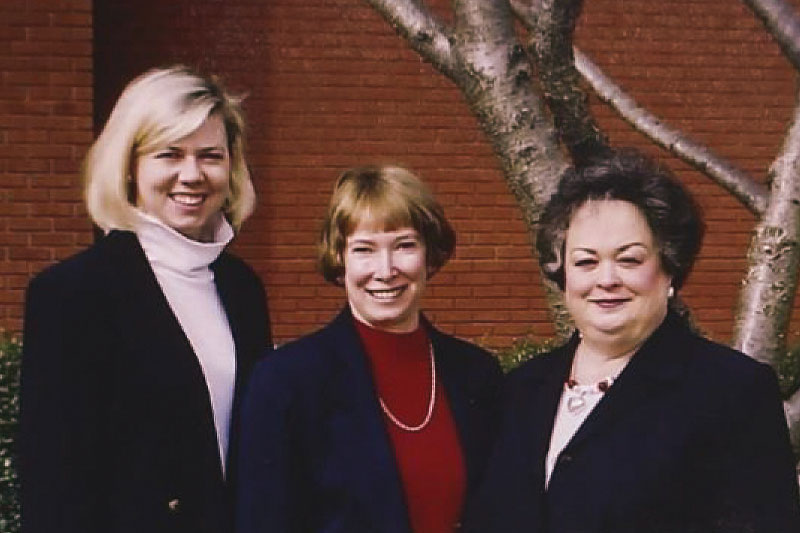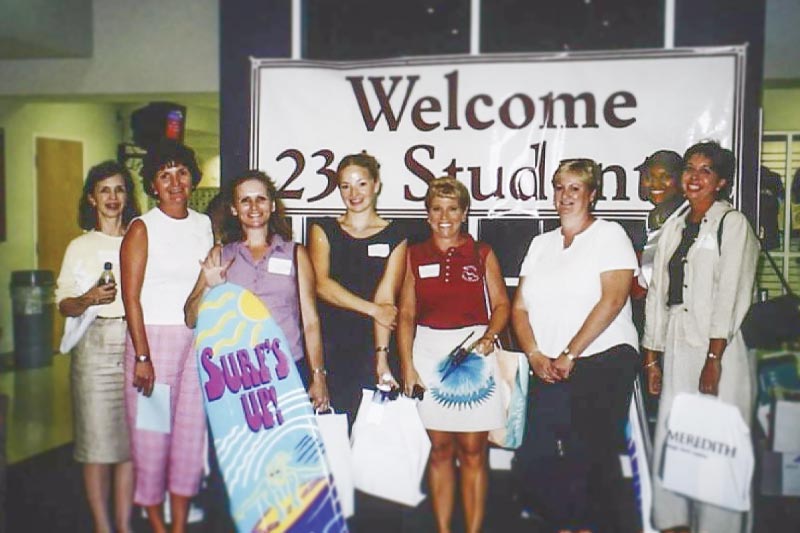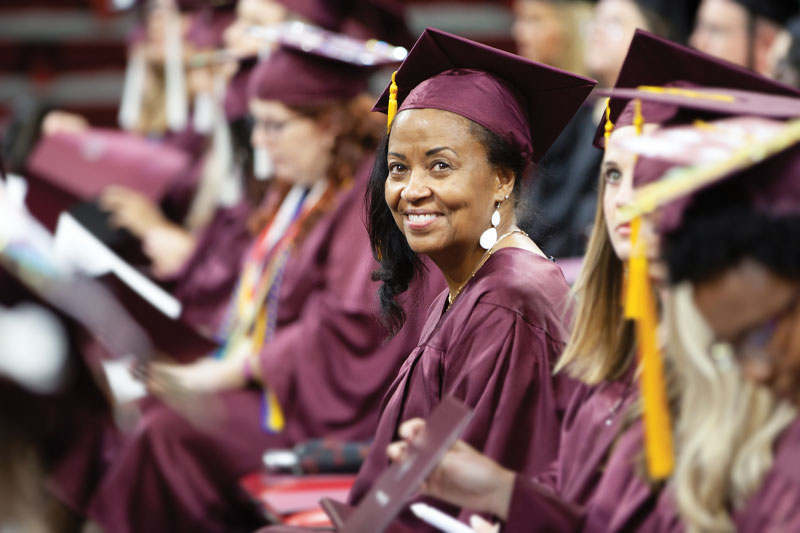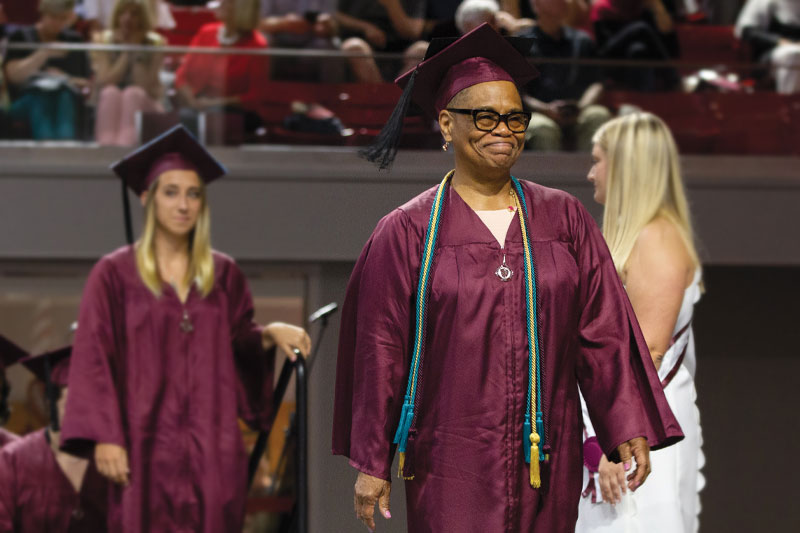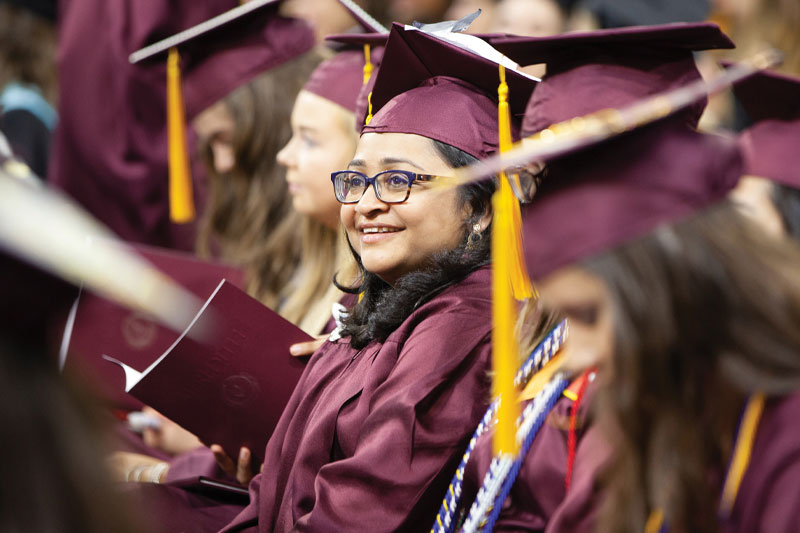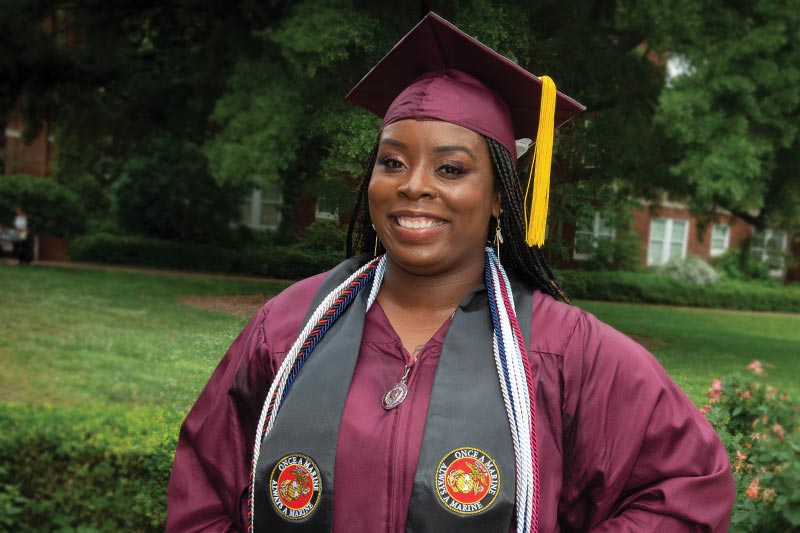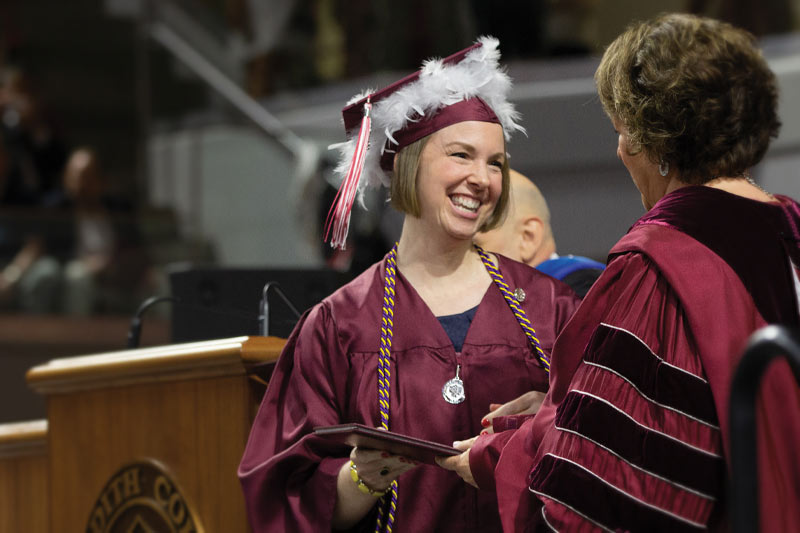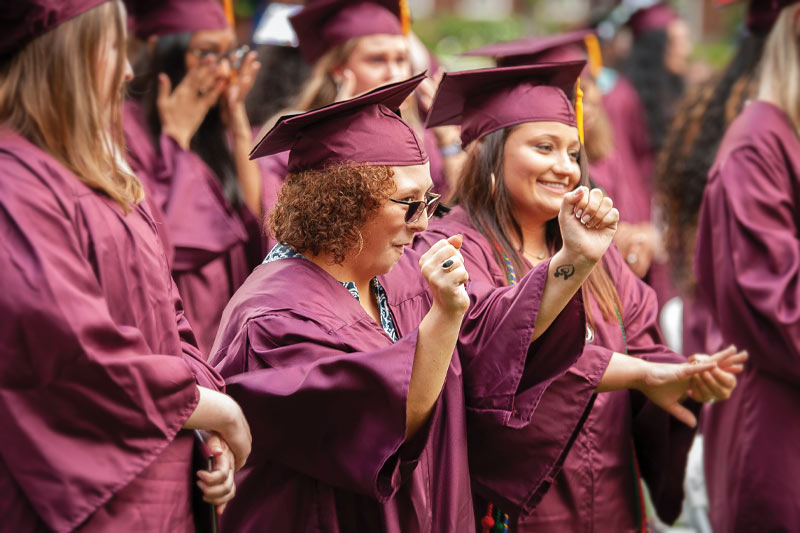Celebrating 50 Years of Wings
Exploring the History of Meredith’s Adult Education Program
By Taylor Sexton
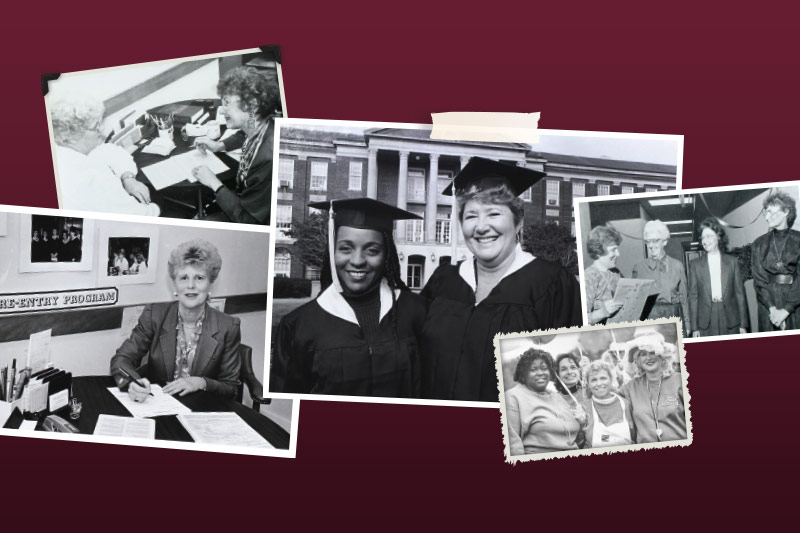
Celebrating 50 Years of Wings
Exploring the History of Meredith’s Adult Education Program
By Taylor Sexton
The year is 1972. Looking around, you can find men and women clad in bell bottoms in various colors and patterns. “American Pie” is number one on the charts, and no matter what station you change your radio to, you can’t escape Don McLean singing about the day the music died. It was a year of firsts as well. NASA launched the Space Shuttle Program, the Dallas Cowboys won their first Super Bowl, Title IX was signed into law by President Richard Nixon, and speaking of Nixon, who can forget the scandalous Watergate?
In 1972, historic events were happening worldwide, and Meredith College was no exception. Because this was the year Meredith’s adult education program, now known as Wings, began. The program was designed to help women ages 23 and older continue their education and graduate with a bachelor’s degree.
The idea of adult education at Meredith bloomed before the ’70s. As a result of a self-study conducted in 1969 for the Southern Association of Colleges and Schools, the College Committee on Continuing Education recommended establishing a program for adult women. They felt such a program fit with Meredith’s mission to educate and strengthen women.
The 1970s
In 1972, Meredith’s sixth president, Dr. John E. Weems, was sworn in, and from the beginning of his time at Meredith, he took a particular interest in continuing adult education. In August of the same year, he hired alumna Anne Clark Dahle, ’54, as director of continuing education.
“When I was hired, I was not a professionally trained adult educator, but I was in a transitional stage in my own life and had a keen understanding of the needs of women who wished to re-enter school or to return to work after a period of time away from work and school. Because of my own needs, the first stages of the program were directed to people like myself,” said Dahle in a 1977 interview.
Enrichment courses were offered during public school hours, allowing women with children to attend classes without worrying about finding a sitter.
The women’s rights movement of the 1960s and 1970s contributed to the rise in adult women looking to gain their education. At the time of this movement, women were seeking to obtain equal rights and opportunities, as well as greater personal freedom.
“Each day of school, each class, presents a new and exciting experience to me. I am also delighted at the new faces of other women that I see increasing in number on the campus; women who seek, as I did, to add new zest to their lives after the homemaking years are no longer demanding so much of their time,” wrote adult student, Virginia Norton, in 1976.
The adult education program grew as enrollment rates increased. Toward the end of the decade, the program included credit courses for adult women, enrichment courses for all ages, faculty and staff development programs, and programs offered at Meredith by community groups.
“These trends in part-time, non-credit, and older student enrollment indicate a changing profile of student enrollment as we move into the 1980s. The profile reflects a more mature student, often with job and family responsibilities, an increased orientation toward career-focused education goals, and often, an increased interest in learning experiences as an enhancement of the cultural quality of life,” Weems wrote in 1977.
The 1980s
“The first thing I think about in reflecting on the past ten years is the establishment and rather phenomenal growth of continuing education,” said Allen Burris, vice president and dean of the College in 1982. “The adding of post-baccalaureate programs … will be a part of the future. In other words, organizing for the older student has been an important trend in the last ten years. It will continue to be.”
At this point, Meredith’s Continuing Education gained state and national recognition for its innovative nature.
The adult education program was renamed the “Re-entry Program,” and enrollment rates continued to soar. Of the 2,000 students attending Meredith, approximately 18% were adults.
Women In New Goal Settings (WINGS), from which the adult education program would later get its name, was an informal organization that helped support non-traditional students. It became particularly active during the ’80s. The organization sponsored orientation programs, support groups, and social activities, and kept members up-to-date with events and happenings around campus.
Each re-entry student had her strength to share and a story to tell, and Dahle said there was one student’s success who made all of her efforts to better the adult education program worthwhile. Lillie Lawson-Jones, ’82, gained her degree in five semesters and three summer sessions on a study release from prison. Lawson-Jones shared her story in the fall of 1983 Meredith Magazine.
“This was a new experience for both of us. She had to learn the college procedure, and I had to learn the prison procedure. It took time and patience,” said Dahle.
For years, Lawson-Jones had dreams of going to college and becoming successful. She dropped out of high school in tenth grade but gained her GED before incarceration.
“When things were getting so that I thought I could push to come out on study release, I had read the catalogs from NC State and Peace and Meredith. Something about the description of student life at Meredith said to me, ‘This is the environment that’s going to provide the nurturing you need in order to do whatever it is you’re going to do with your life,’” said Lawson-Jones.
Lawson-Jones was eager to learn, and she never avoided difficult courses. Instead, she met each challenge with determination and enthusiasm. There were voids in her educational background and several times when the prison and college systems were not in sync.
“She often felt caught up in situations that had no solutions. During these times, she always came to talk. We worked hard together to understand the problems and to solve them,” said Dahle. “Working with Lillie Lawson-Jones has been the most rewarding experience of my last five years. Probably my entire career.”
Lawson-Jones went on to earn her master’s in social work at UNC, hoping to one day bridge the gap between the free community and the incarcerated community.
“I feel that I’m ready to tackle it all,” said Lawson-Jones.
The 1990s
By 1992, the Re-entry Program celebrated 20 years and had a total of 560 graduates since forming in 1972. Non-traditional students made up 20% of Meredith’s student population, and the adult education program was renamed 23+.
Meredith continued to recruit non-traditional-aged students and saw value in the unique perspectives they would bring to the classroom. The adult education programs faced some challenges over the years, including student finances and acceptance by traditional-aged students in the classroom.
Despite these challenges, the enrollment rate for adult students was projected to grow even higher by 2000, so the demand for staff in the program grew as well.
In 1997, Sandra Close, ’86, took over as director of the 23+ program, having worked for the department as assistant director since her graduation. As a 23+ graduate, she brought the student perspective to the program and understood the wants and needs of students.
Close came to Meredith at 40 after being encouraged by a friend to attend a class. She explained how the times were different when she was 18 and how most women usually became a teacher, a secretary, or a nurse. In her case, she married young and had worked as a nurse for years.
She described her time at Meredith as a challenging but empowering experience. Close wanted to continue encouraging and guiding women like herself.
“I could tell them exactly what they were going to face. But, the big thing was that it changed my life so much that I wanted other women to see what it could do for them to get a degree,” said Close. “I felt stronger.”
The 2000s
Close retired as director in 2002 but would remain an active alumna and vital part of the adult education program. Later, in 2013, she received the Distinguished Alumna Award and had the Sandra Critzer Close Scholarship endowment established in her honor to support adult students.
“Sandra Close is a powerhouse,” laughed LeNelle Patrick, who joined the 23+ program staff in 1999.
During the 2000s, the 23+ program worked toward several goals, including providing comprehensive evening classes for women, improving the retention rate of 23+ students, determining the need and impact of financial aid on students over 23, and examining issues relevant to adult students and helping them advocate for change.
Patrick helped establish the National Honor Society for Adults, Alpha Sigma Lambda, and actively worked with the rest of the staff to create an environment where students could succeed.
“We had an entire floor in what was then called the Cate Park Center. We were a one-stop shop back in the day. I recruited, I advised, and I was on the student organization, WINGS. We were doing admissions and everything a student over the age of 23 could need,” said Patrick.
Despite the support provided to students, the 23+ program began to dissipate. Many students didn’t want to go through the program and would rather go through the standard admissions office.
By 2008, the 23+ department was split up, with many of the staff being transferred to work in admissions.
The 2010s
In August of 2014, President Jo Allen revived Meredith’s commitment to adult education after an outpouring of support from faculty, staff, and alumnae, many of whom ended up donating money to reinvigorate the program.
“Meredith should be uppermost in the minds of all women who seek higher learning as a route to a better future,” Allen commented in 2014 following the announcement. “We know it makes a difference in their personal and professional lives, as well as in the lives of their families, communities, and our world.”
The adult education program was renamed from 23+ to Wings-Adult Education Program, and in February of 2015, Tom Manning was hired as director of Wings.
“I was tasked with helping the College understand how the Wings students were experiencing Meredith and helping to identify things that needed to be fixed or done differently to make it easier for them to navigate.”
Having been an adult student in college himself, Manning knew the importance of creating a space within a college where non-traditional students could feel accepted and supported.
Manning is currently the only staff member of Wings since students go through Meredith’s regular admissions, advising, and financial aid processes.
“I’ve done a lot to help make this a very welcoming, personally supportive program,” said Manning. “I’m trying to meet with them and create a more seamless environment so they don’t have to go from office to office and try to understand all the language of higher education.”
The Future of Wings
Manning has big plans for the future of Wings, including a financial program that would allow Meredith to meet the needs of students when they have a gap between tuition and financial aid.
“That’s a big reason people don’t come,” he said. “They’re making a lot of sacrifices to be here, and it breaks their heart when they find out they cannot attend Meredith after they’ve gone through the whole process.”
The increased financial support will be an essential part of the program’s evolution, and Manning hopes it will continue long after he is gone.
“It is exciting that we get to roll it out during the 50th anniversary,” said Manning.
The hope is that with this financial assistance available to adult students, more women will be able to attend Meredith and achieve their dreams of a college degree.
Since the comeback of Wings, several inspiring success stories have come out of the program.
One of these students includes Parimala Prahalad, ’20, who came to Meredith to earn her degree in biology after realizing she wanted to go to dental school.
“We are given the encouragement, the advice, and the support we need by the faculty, staff, and administration to succeed once we graduate,” said Prahalad about her experience. “I can confidently say that Meredith provided me with all the tools to become a strong and successful leader in my field of study.”
Another student who soared in the Wings program was business administration major Krystee Chase, ’18, who was provided with the tools she needed to excel in her career. She was initially concerned about the amount of time that had passed since she had been in school, but Chase ended up thriving.
“The tailored support for my educational development attracted me to the Wings program,” said Chase. “It provided me with a community within the sisterhood of Meredith, which gave me a sense of belonging.”
Chase became a recipient of the 2016-17 Meredith College School of Business Entrepreneur Elevator Pitch Award for Best Idea, was a semi-finalist for the Meredith College Social Entrepreneurship Challenge and led an HR Audit Research presentation on CSA Day at Meredith.
These opportunities, as well as her relationships with faculty, staff, and classmates, enriched her educational experience and gave her the confidence she needed to succeed.
“Balancing life as a working mom and as a full-time student, along with unforeseen occurrences, was the biggest challenge that I faced. I learned that my drive and determination will not allow me to become defeated.”
In 1973, Dahle wrote, “With a Continuing Education Department, we hope to encourage more women to take advantage of these opportunities.” Her hopes came true because 50 years later, the adult education program has continued to soar and empower women of all ages in all walks of life.


